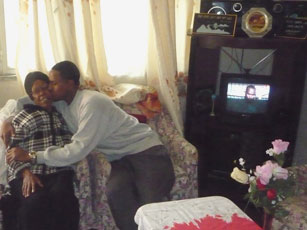Tadias Magazine
By Tesfaye Negussie
Published: Thursday, April 14, 2011.
New York (TADIAS) – “United We Stand, Divided We Fall,” was the theme for the Ethiopian government’s Five-Year Growth and Transformation Plan Convention in Harlem last Saturday. Both government and opposition supporters came out to fill the seats at the convention, while protesters held a demonstration outside.
New York City was one of 14 cities in North America where the Ethiopian Embassy launched the continental tour last week.
From Washington, D.C. to Los Angeles, Ethiopians across the country appeared divided as the events were met by protests in most venues.
“These people over here, they should be ignored,” government supporter, Mehretab Assefa said of the protesting opposition. “It’s like talking to a deaf man because, really, to me, they are irrelevant.”
Government opposition chanted, “Meles is a criminal!” and “Down with EPRDF!” referring to the country’s long-serving Prime Minister, Meles Zenawi, and his ruling party, the Ethiopian Peoples’ Revolutionary Democratic Front.
Outside of the Adam Clayton Powell Jr. State Office Building, the opposition was protesting alleged human rights violations and unfair distribution of wealth. Inside the building, the Ethiopian government was promoting investment from the Ethiopian Diaspora to Ethiopia, to help build its economy.
“There is no opportunity for investment without freedom,” protester Abate Kassah said. “Ethiopia is receiving so much international aid, and yet it’s among the poorest countries in the world.”
Director General of the Ethiopian Commodity Exchange Authority, Ambassador Dr. Addisalem Balema, led the discussion during the convention. Balema said the country’s goal is to become a middle-income country in the next 12 years, although he admits that it is an ambitious plan.
According to the Heritage Foundation 2011 Index of Economic Freedom, Ethiopia rates 144th in the world, in economic freedom. When asked how Ethiopia can expect to grow its economy through private investments and entrepreneurship with such low ratings in economic freedom, Balema cast The Heritage Foundation aside as an agency that was acting as an agitator. He said that the audience should not worry itself with Ethiopia’s ranking in frivolous polls. However, Balema added that Ethiopia might have to change its economic-freedom policies if it wanted to be accepted into the World Trade Organization, as it is currently bidding for enrollment.
Balema added that the government plans to achieve these goals through a variety of efforts: bolstering a currently inefficient national tax collection program; opening Ethiopia’s agricultural economy to large and small foreign business by leasing fertile land and offering tax incentives; and promoting social justice and democratic rule around the country; among other things.
Ethiopia’s low-lease costs and tax incentives for fertile land in the country are attracting big businesses around the world to farm their products in Ethiopia. News reports say that farmers in Gambella, in southwestern Ethiopia, are being forced off of their property to make way for these large companies.
“As we speak, now, they are jailing people, they are jamming radios, they are jamming Internet,” protester Tedla Asfaw said. “Investment in a society where you have no right? What kind of investment is that? That is a joke!”
When asked of the reports of social injustices by forcing local farmers to leave their livelihoods to accommodate large foreign companies, Balema replied that “not one farmer” has been involuntarily moved off of their land. He assured the audience not to trust the reports. Balema added that the only land that is being leased to foreign companies is unsettled. It doesn’t make any sense for the Ethiopian economy to not use unsettled, fertile land, Balema said.
According to Darryl Vhugen, a senior attorney and land tenure specialist with Landesa, a non-profit organization that partners with governments to secure land rights to the rural poor, just because a farmer doesn’t have documented rights to a property, it doesn’t mean, in many developing countries, that they don’t have legitimate, longstanding rights to the land.
According to Vhugen there would be a greater chance of long-term agricultural, economical and social success if governments incorporate local farmers into land deals with the foreign investors. His argument is that in most cases small farms are more productive than large farms and if the small farmers are involved in the negotiations, they are less likely to cause unrest in the region.
In so many words, Vhugen is saying, “United You Stand, Divided You Fall.”
—–
About the Author:
Tesfaye Negussie is an Ethiopian-American journalist and videographer. He has freelanced for NBC’s TheGrio.com, The Washington Post, PBS, NPR, The Village Voice, and several other media outlets. He holds a Masters degree in broadcast journalism from Columbia University. He is currently the Co-Founder and Executive Producer of United Nile Media.
Editors’ Note:
Tesfaye Negussie attended the meeting in Harlem and participated in the question and answer session. He was not allowed to bring recording devices such as video camera or audio recorder inside the meeting. As a result, the following video was shot outside the convention and shows only the protesters.
WATCH:

